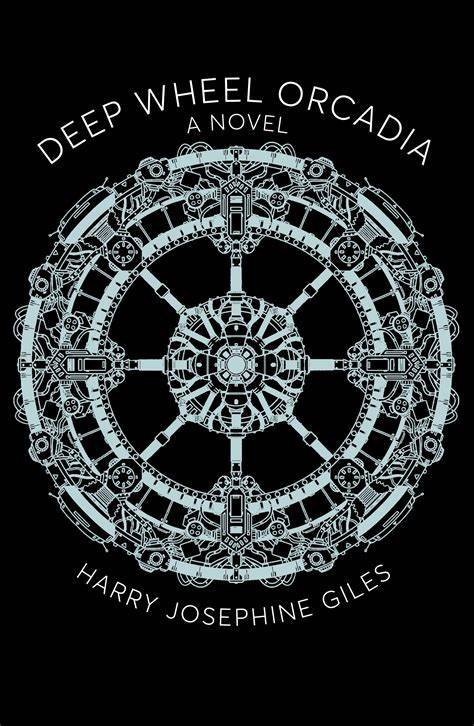Deep Wheel Orcadia by Harry Josephine Giles
Publisher - Picador
Published - Out Now
Price - £10.99 paperback £4.99 Kindle eBook
Astrid is returning home from art school on Mars, looking for inspiration. Darling is fleeing a life that never fit, searching for somewhere to hide. They meet on Deep Wheel Orcadia, a distant space station struggling for survival as the pace of change threatens to leave the community behind.
Deep Wheel Orcadia is a magical first: a science-fiction verse-novel written in the Orkney dialect. This unique adventure in minority language poetry comes with a parallel translation into playful and vivid English, so the reader will miss no nuance of the original. The rich and varied cast weaves a compelling, lyric and effortlessly readable story around place and belonging, work and economy, generation and gender politics, love and desire – all with the lightness of touch, fluency and musicality one might expect of one the most talented poets to have emerged from Scotland in recent years. Hailing from Orkney, Harry Josephine Giles is widely known as a fine poet and spellbindingly original performer of their own work; Deep Wheel Orcadia now strikes out into audacious new space.
Looking at the Clarke Awards for me a good shortlist shows the facets of science fiction. Its not simply something no one has seen before. Sometimes a great idea will need to be shaped by several authors over the years before it reaches a highpoint. No what I look for in the shortlist are different ways of showing us what science fiction can be - are they ultimately interesting reads? In Harry Joesphine Gile’s Deep Wheel Orcadia we get an example of this not just for being a poem; nor using the Orcadian dialect in verse but for me the most interesting angle is how it takes Orcadian language and culture and transplants that to the vastness of space. I’m not sure its 100% successful in its approach but a reminder that SF is more than modern Brtish and Americans in the future who act and talk just like modern day British and Americans.
Deep Wheel Orcadia is a space station surrounding a gas giant and its intricate moon system. There, the families that work in space harvesting Lights. Mysterious energy units that are useful for space travel and the wider economy. Orcadia is very traditional, and its practises have been handed down for centuries. To it arrives. Darling is on the run from her wealthy family and seeks shelter and anonymity here. Astrid is from the Wheel but has spent time away in other colonies and comes home but finds it perhaps no longer her home. Elsewhere the colony is worries by rumours the Lights are getting more powerful, and people press for some change in the way life is done.
It is worth stating that this poem is split into sections so that you can read it in the original Orcadian and then move to an English translation. Interestingly this doesn’t fit word for word so easily and so we get words that can have multiple meanings and Giles merges them so for example we hear of ‘the ‘strormstrifestrainspeeddust in the golden seatimetide, about the peace of distance’. These terms are strange, unfamiliar and add poetical complexity to the language in a way I was not expecting; a way of showing the futurespeak we are so used to reading in SF is not applicable here. But ultimately, I found this approach to the story one that strained my limited abilities as a reader as while I initially enjoyed reading a few sections in the dialect just to get a feel for the flow of words I ended up preferring to just read the english sections and the unusual cadences there for me where more effective at communicating the story. That says a lot for my lack of skills as a translator in my head.
What I did enjoy though is how Giles gives us a reminder that space doesn’t just belong to people who sound like they come from New York or London. Here Giles gives us Orcadian culture in space; the fishing villages are now trawling the spacelane’s for Light; there are dances and naming ceremonies and also generational battles. Such as Astrid the islander who has seen the Mainland side of space. All of these are experiencing the Orcadians of the UK may have experiences over the years.
I also enjoyed how Giles focuses on the characters with Darling the visitor from afar always on the run despite chasing name, gender and ever running away just possibly finding love at last. Astrid who sees the tension of gradually becoming an outsider to her own family. But I never felt the story hung together quite well. everything trails off into a series of acts awaiting something to happen. The science fiction elements of the story aren’t that unique - first contact, humans not recognising other forms of life, tensions between home and the wider world (some explored for much more interestingly in other candidates). Ultimately, I never felt awed in fact the bigger SF elements don’t feel as useful to a story that is better at the personal dynamics being emoted than trying to go big on safe opera and not really explaining much even with a small nod to Norse myth in the end. A smaller scale tale would probably have really won me over
So should it be on the list. Yes. Is it worth time to ponder - I think it should be a reminder that SF can be poetry and translated fiction, it can reflect other cultures and ways of looking at the future but ultimately it is not the most interesting example of doing that I’ve encountered and so I think not near the top of my list so far. Still worth a try.
